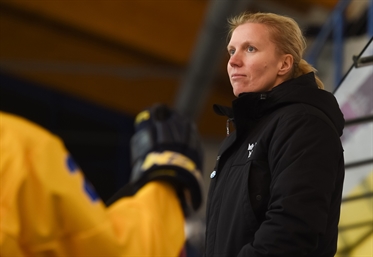Lindberg behind the bench
Lindberg behind the bench
2006 Mirakel player now a coach

 ZLIN, CZECH REPUBLIC - JANUARY 8: Sweden's head coach Ylva Lindberg looks on during preliminary round action at the 2017 IIHF Ice Hockey U18 Women's World Championship. (Photo by Andrea Cardin/HHOF-IIHF Images)
ZLIN, CZECH REPUBLIC - JANUARY 8: Sweden's head coach Ylva Lindberg looks on during preliminary round action at the 2017 IIHF Ice Hockey U18 Women's World Championship. (Photo by Andrea Cardin/HHOF-IIHF Images)
Without question, the “mirakel,” 3-2 victory over the United States in a shootout in the semi-finals at the Turin Olympics was the greatest upset in the history of women's hockey.
Sweden went on to win silver that year. Lindberg had played on the “semi-mirakel” team of 2002 in Salt Lake, when an unheralded 15-year-old goalie named Kim Martin propelled the team to a very unexpected bronze medal. Lindberg also played at the inaugural Olympics for women in 1998 as well as six Women’s World Championships between 1994 and 2005.
Her resume is second to none in Sweden, so when she talks, players listen.
“I was playing for a women’s club team in 2009, and I was injured,” Lindberg explained of how she went from player to coach without so much as thinking about it. “Our coach asked if I would help coach the defence, and that’s how it started. After that, I stopped playing and focused on coaching.”
Lindberg reflects on that Mirakel of 2006 and is left as confused as the rest of the world why that moment didn’t spark an interest in the game for a new generation of girls the way the 1980 Miracle on Ice did for men’s hockey in the U.S.
In truth, since that win, the Swedes have been, if anything, a disappointment at the senior level, losing the bronze-medal game at both the 2010 and 2014 Olympics and not winning a single medal at the WW since bronze in 2007.
“It was a challenge to get to where we did,” Lindberg explained. “We worked hard for so many years, first for Salt Lake and then Turin, so it was like ten years of hard work. Maybe when we got the silver we got too comfortable and stopped working so hard? And then we had a few years when both the players and the leaders in Sweden’s women’s hockey maybe didn’t work as hard as we needed to to earn further success in big tournaments like the Olympic Games and World Championships.”
She’s not sure. She’s looking for answers. The Turin Games was such a high point, and that team featured a veritable who’s who of the greatest Swedish women players—Erika Holst, Maria Rooth, Gunilla Andersson, Pernilla Winberg, Martin, Lindberg.
All Lindberg can do now is help the current young generation of talent, hope the players train hard and take the game seriously, and do her best to set the stage for another great performance at the Olympics.
“Hockey is my love,” she enthused. “We work a lot with young players just to give them a chance to succeed. Of course, we know Canada and the United States are a bit ahead of us, but we need to see possibilities to create our own game, our own skilled players who develop a lot of confidence on the ice."
At about the same time Lindberg retired and started to coach, she also pursued a professional career as a police officer.
“I work in the department that responds to 1-1-2 calls, emergency calls,” she said. “I’m out in the community, in Stockholm.I am a police officer full time, but when I’m here coaching, this is all I do. I needed an education and a career, so I thought being a police officer was good work. I started in 2007 just after Torino. In fact, when I ended my hockey career, it was when I was at the police academy. It’s hard to work night shifts and practice with the team at the same time. That’s really the reason I stopped playing.”
Lindberg guided last year’s team to a bronze at the WW18 in St. Catharines, Canada, and hopes she can keep coaching the junior girls for a while yet.
“I love the sport now just as much as I loved it when I played, so I hope to continue,” she finished. “I love the leadership and to see the players grow during the time I have them. Working with the younger players is a great opportunity. Next year, it’s another team; it’s never the same group, so it’s a huge challenge but very fun. At that age, they’re full of energy. They just go and go and go!”
Back to Overview

















































